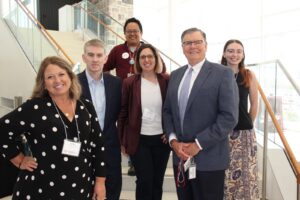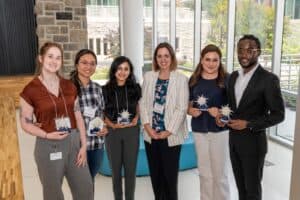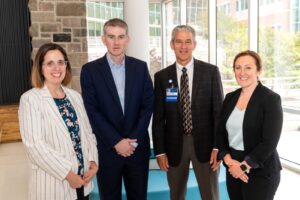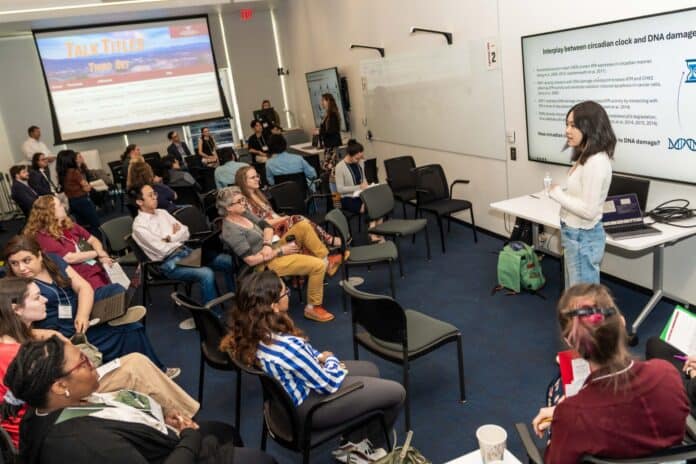For every careful step forward in cancer research, there is a patient waiting — a family holding its breath in the middle of the night.
That reality was clear at the Fralin Biomedical Research Institute’s Cancer Research Symposium in Roanoke held June 11-12.
The annual event, organized this year by the Fralin Biomedical Research Institute at VTC’s Cancer Research Center in Roanoke, was created to bring together researchers — including faculty, clinicians, and students — who are united by a passion to understand cancer, improve treatments, and develop cures.
Lisa Ward, a lawyer and mother whose son Jace died from brain cancer, set the tone with a keynote address that blended personal testimony and a clear call that cancer research needs to pick up the pace. She challenged researchers to consider not just what’s possible in the lab, but what’s urgent in the lives of patients who may not have time to wait.
Ward said her son was diagnosed with diffuse intrinsic pontine glioma while he was a junior at Kansas State University. The cancer cells grow alongside healthy brain cells in a critical region of the brainstem.
With no surgical options, Jace decided to enroll in early stage, experimental CAR-T cell therapy at Stanford, knowing that it wouldn’t save his life, but it could help other young people in his situation.
“Jace would say, ‘I’m not afraid to die, I’m afraid not to make an impact before I do. If I don’t have a long time, I need to know, because I need to get busy fast,’” Ward said.
Ward said experimental treatments may come with risk, but for families facing terminal diagnoses, delay feels more dangerous than action.
“When it’s terminal cancer, doing nothing is not ‘doing no harm,’” she said. “The status quo ends badly. You are the bridge to hope. You can do what we can’t. But we can help you do it faster.”
She urged scientists to partner with families in the research process — not as subjects, but as collaborators.
Jennifer Munson, director of the institute’s Cancer Research Center in Roanoke and organizer of the symposium, said including the patient and family perspective was an intentional part of the event.
“When you’re working on something like cancer, you’re solving scientific problems — but ultimately, it’s about helping patients,” she said. “And the best way to understand how to do that is by listening to patients and their families. She [Ward] really highlighted her son’s battle with cancer and all the efforts she’s made to close that gap between the science and the clinic and the patients.”
Michael Friedlander, executive director of the institute and Virginia Tech’s vice president for health sciences and technology, said Ward delivered a powerful reminder of why cancer research must move quickly.
“While we may be doing research in our labs that have horizons of 10 or more years, to the families we heard from today, it’s not a 30-year horizon — it’s today, it’s tomorrow,” he said. “The public is waiting. They’re waiting for us to produce and deliver these treatments, cures, and diagnostics.”
Friedlander praised the work of investigators and the courage of families who continue to participate in research despite unimaginable challenges.
“Their experience is not peripheral to our work,” Friedlander said. “It’s at the center of it.”
Affirming that sense of mission was Chris Hourigan, director of the Fralin Biomedical Research Institute’s Cancer Research Center in Washington, D.C., which will be the site of next year’s symposium.
“As a medical oncologist, I have the vision of all the patients we’ve been able to help and also the patients we haven’t been able to help in the ways we wanted to,” Hourigan said. “That sense of rage that we should do better — that Lisa spoke about — is with us. You can call it energy, drive, or purpose, but we know people are out there expecting us to do this work. It’s important work in the public interest, and we’re not tolerant of delays. People are counting on us.”

Empathy was evident in a conversation between Ward and Virginia Tech cancer researcher Fred Wu, who invited her to the symposium. Wu, a physician-scientist with research programs in both Roanoke and at the Children’s National Research & Innovation Campus in Washington, D.C., reflected on how meeting Ward changed the way he thinks about his patients, who face logistical and emotional challenges beyond their cancer diagnoses.
“I’ve learned more about the process involved in what families and patients have to go through just to get therapy,” he said.
“We forget the 4-year-old with brain cancer might have a newborn sibling that has to tag along, and the family maybe doesn’t have gas money,” Ward said. “On the family side, in the middle of the night, we’re thinking: Our child’s not getting better. Is anybody still awake? Does anybody still care?”
Ward co-founded the Tough2gether Foundation, which supports navigation services for families, registries for off-protocol treatments, and a national tumor board that helps connect patients with care.

Across two days, researchers at the symposium presented advances in brain tumor modeling, immunotherapy, and artificial intelligence-guided diagnostics, while patient advocates emphasized the need for compassionate trial design, faster regulatory pathways, and better quality-of-life measures for children in treatment.
Shannon Armbruster, a physician and investigator at Carilion Clinic and associate professor of gynecologic oncology with the Virginia Tech Carilion School of Medicine, spoke about the growing population of endometrial cancer survivors.
Her research explores the long-term health risks and quality-of-life outcomes women face after treatment. She highlighted the cancer survivors’ new health challenges, such as heart disease linked to inactivity, and stressed the importance of designing interventions that fit into survivors’ everyday lives.
“We’re curing the cancer,” she said, “but too many are still struggling with what comes after. We need to make sure survivorship isn’t an afterthought — it’s part of the plan from day one.”

Hosted by the Fralin Biomedical Research Institute at VTC and featuring its new cancer research centers in Roanoke and Washington, D.C., the event illustrated institute’s growing role as a hub for translational science — and as a convener of voices often left out of the research conversation.
“This meeting is about bringing innovators together to share ideas, look for cooperative ways to address the questions more effectively, and to develop new ways of thinking about understanding and treating cancer,” Friedlander said.
Presentations from faculty, students and postdoctoral researchers at Fralin Biomedical Research Institute, the Virginia-Maryland College of Veterinary Medicine’s Animal Cancer Care and Research Center in Roanoke, and from Blacksburg-based researchers highlighted progress in pediatric brain cancer, glioblastoma, other rare tumor types, as well as blood cancers such as leukemia. Speakers emphasized the value of cross-institutional data sharing and of building clinical trials that meet families where they are.
Meanwhile, Ward’s message that research is measured not in months, but in lives, is driving the discussion.
“Every time we wait,” she said, “we lose someone who might have made it.”
By John Pastor


